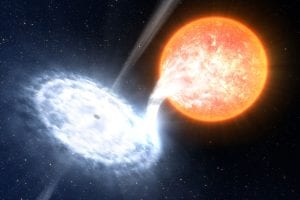
Astronomers can indirectly find black holes by observing disturbances in the usual shape of planetary bodies. Source: Gawker
In the fourth Science Pub of the academic year, Dr. Ryan Hickox of Dartmouth’s Department of Physics and Astronomy and Dr. Jenny Greene of Princeton University’s Department of Astrophysical Sciences led a discussion on black holes.
Dr. Hickox explained that black holes are defined by their powerful gravitational forces. Black holes are so dense that even light cannot escape their pull and are comprised of enormous quantities of matter concentrated into relatively small volumes. Dr. Hickox and Dr. Greene explained that the density of a black hole could be thought of as the mass of the earth compressed into the diameter of a BB pellet.
Although huge gravitational forces cause black holes to emit no light, two primary methods of detection exist. First, accretion, the way black holes devour matter, occurs as the gas clouds or other matter are pulled towards the black holes and begin to accelerate, thereby releasing radiation that can be detected by astronomical instruments.
On the other hand, Dr. Greene explains, astronomers can indirectly find black holes by observing their effects on other objects. Astronomical data collected from the affected objects would contain unusual behavior, such as variation in expected trajectory or even disturbances in the usual shape of planetary bodies.
Dr. Greene detailed the many variations of black holes, ranging from the supermassive, which can be millions of solar masses, to the stellar-mass, which can be a more modest ten solar masses and often occur in binary systems. The earth is due later this year to view flares of accretion of a gas cloud into the supermassive black hole at the center of the Milky Way galaxy, the Sagittarius A-star.
The discussion soon evolved into an open question session with the two astrophysicists fielding questions ranging from whether black holes and dark matter were one and the same (probably not) to whether black holes would eventually cease to exist (with Hawking Radiation, they may evaporate away by the time the universe is a billion times its current age).
Following the question session, the two astrophysicists brought up another important topic relating to their research: whether funding such lofty research was justifiable in a time of limited financial resource. Although Hickox acknowledged that simple love of knowledge sometimes is not enough to justify the expensive work, Greene pointed out that understanding is “an important part of being human.” Plus, “black holes are sexy.”
Leave a Reply